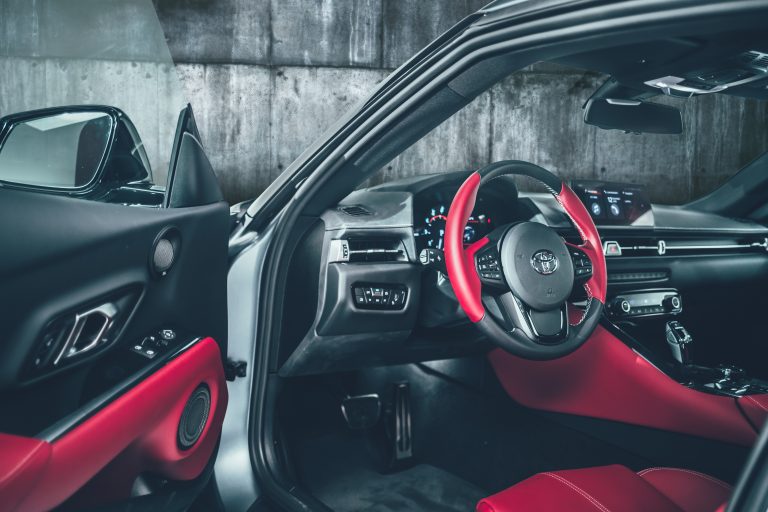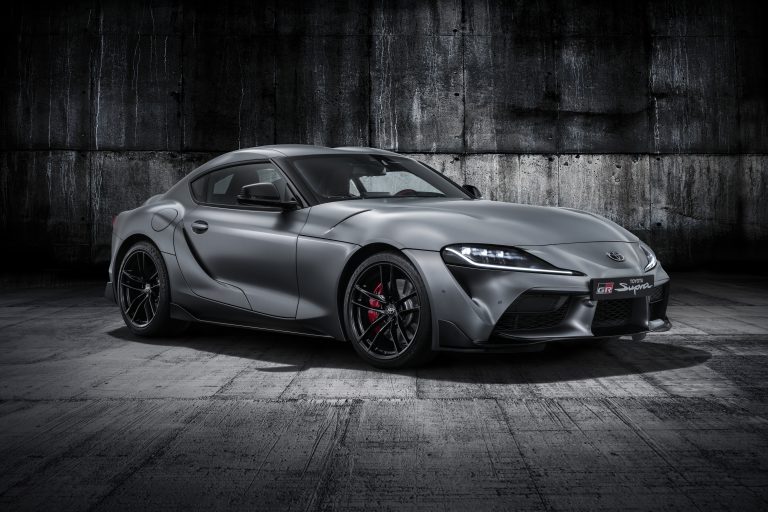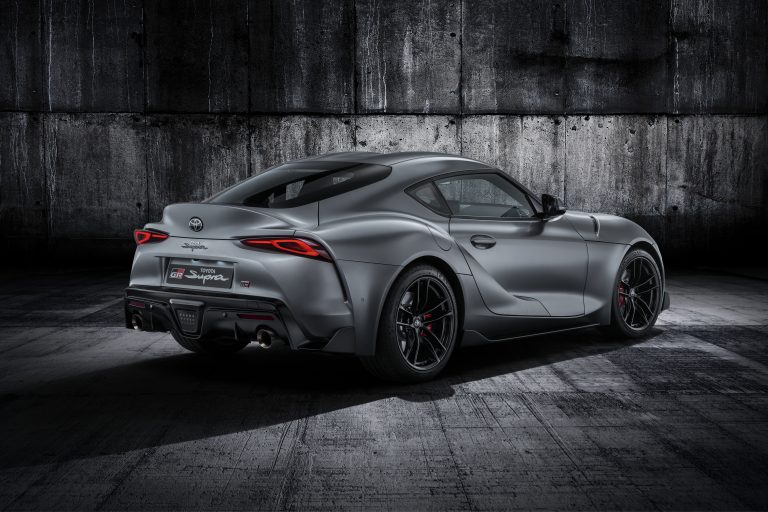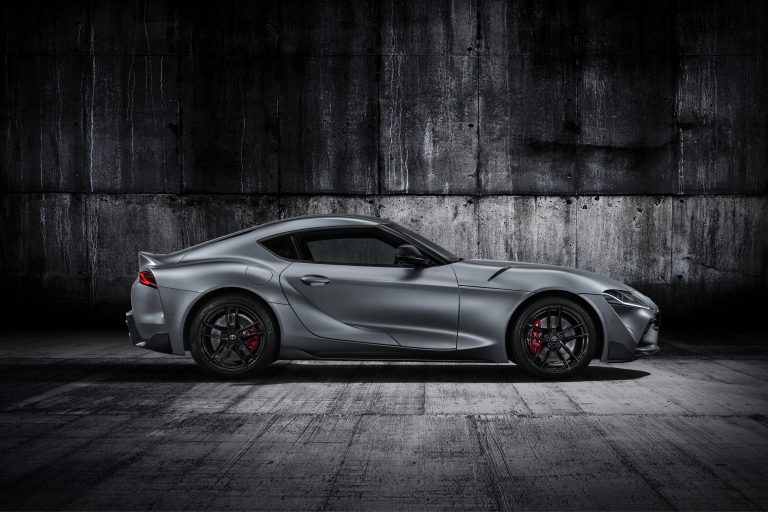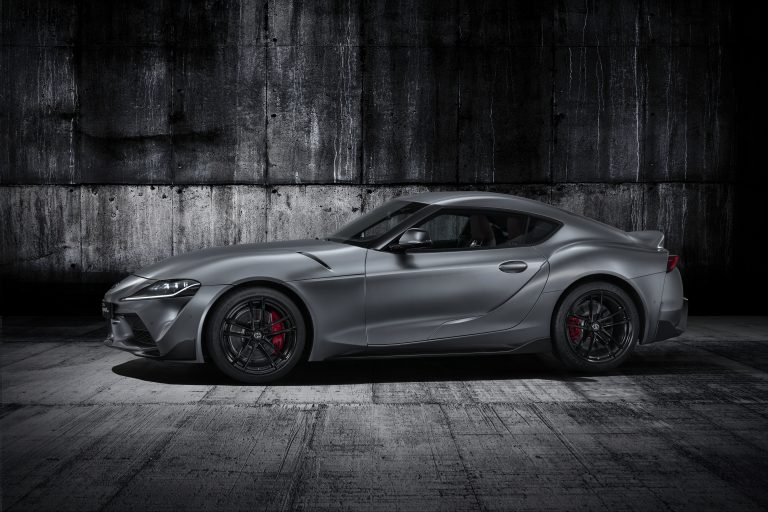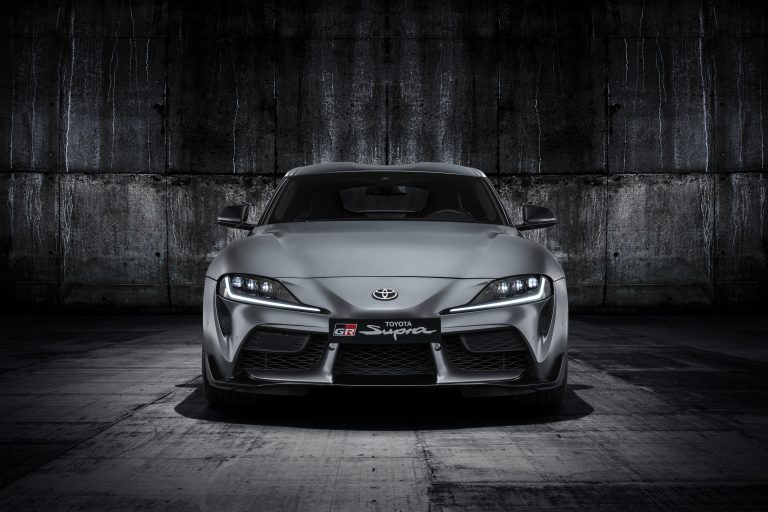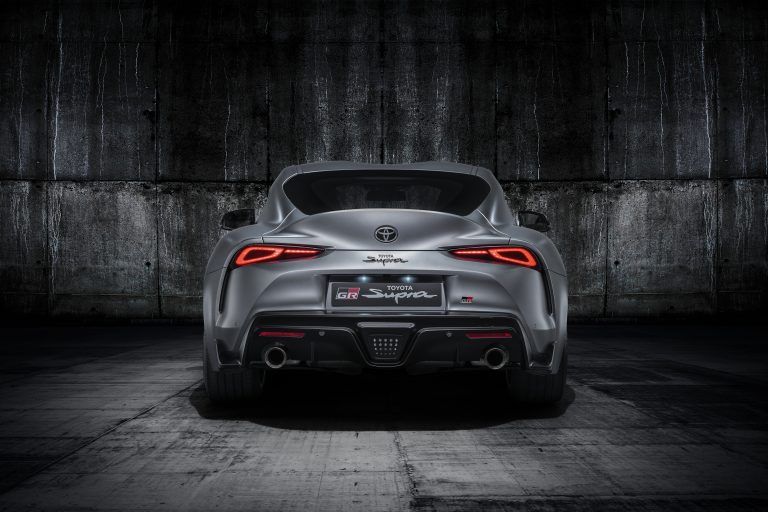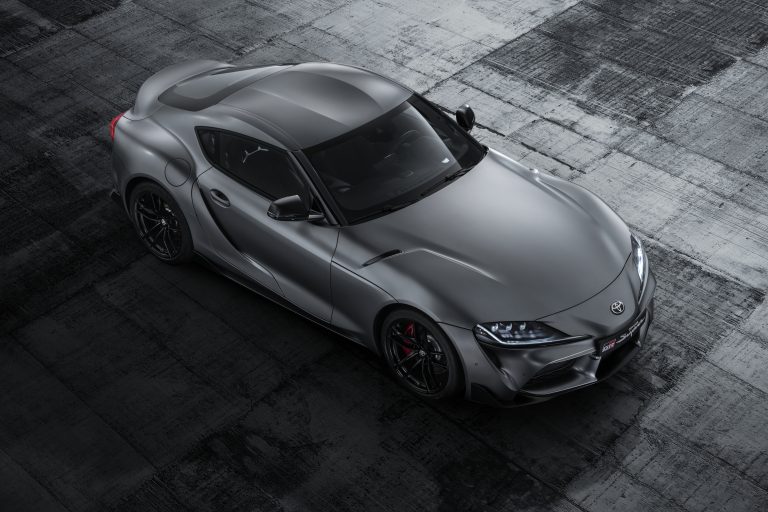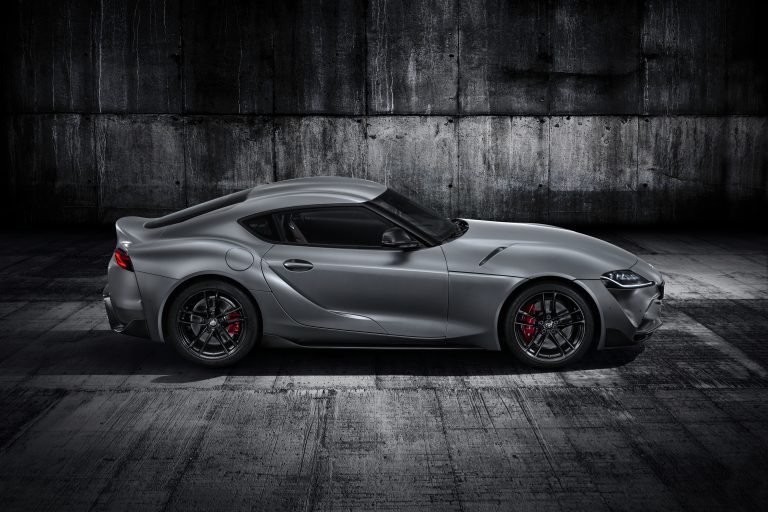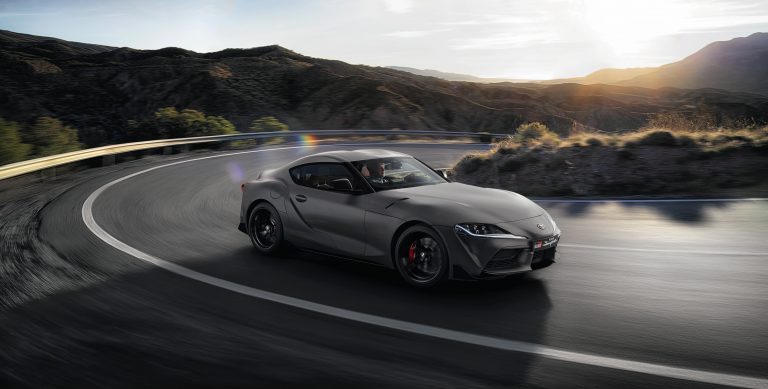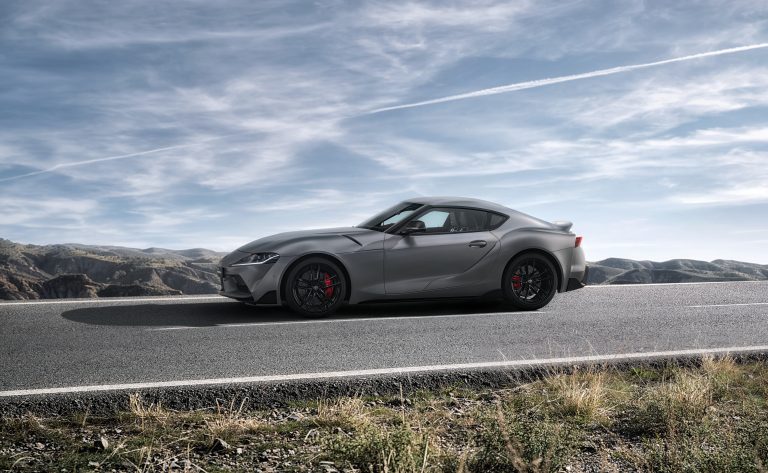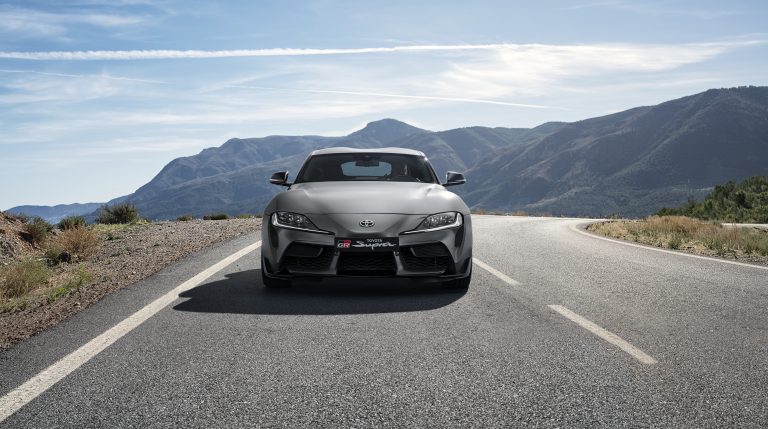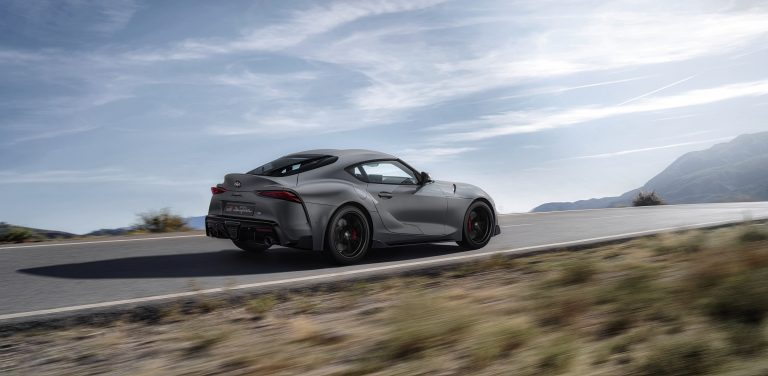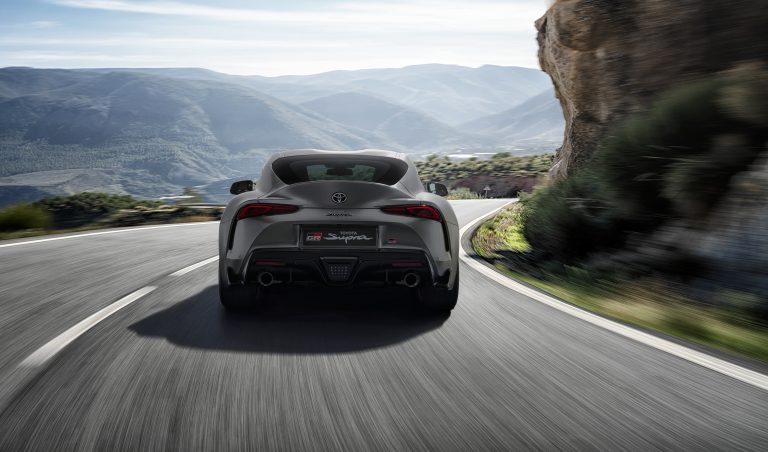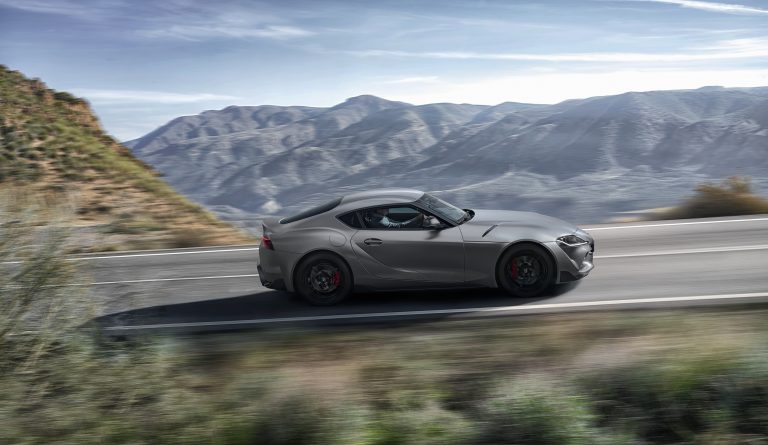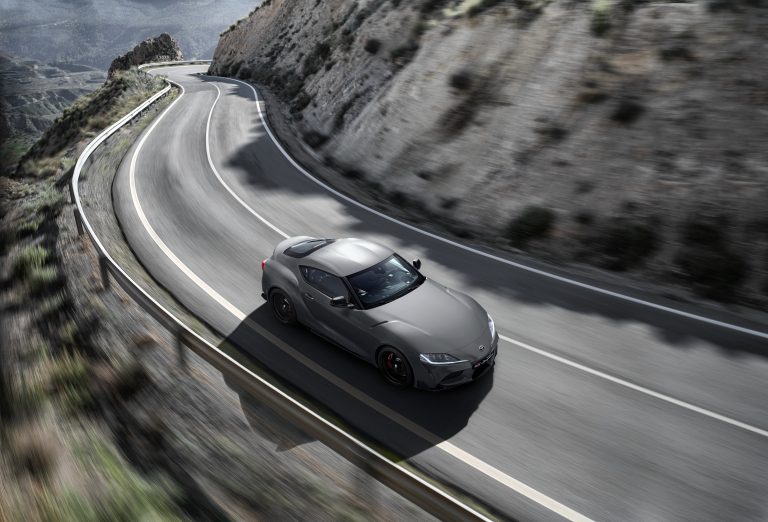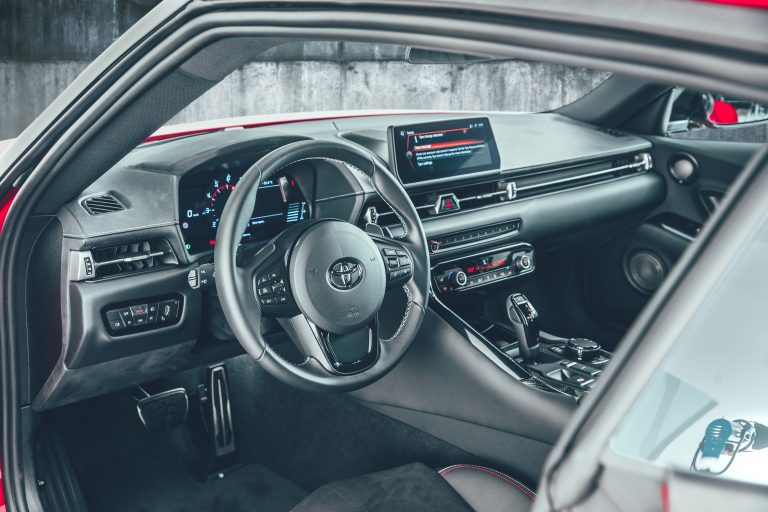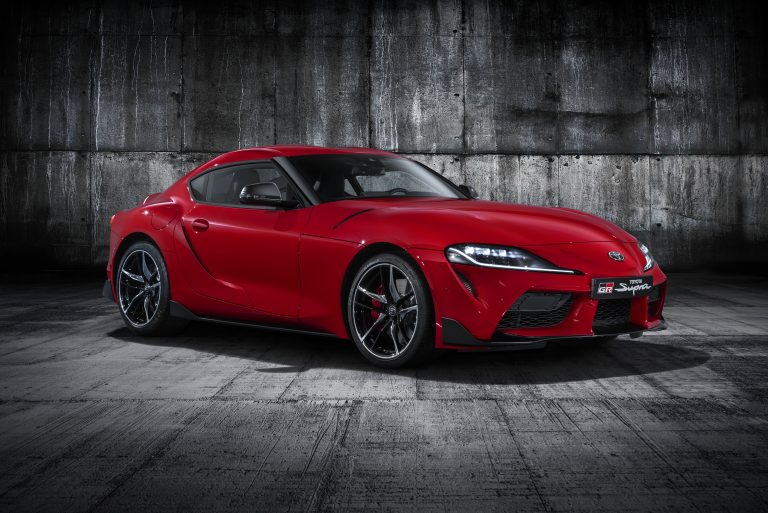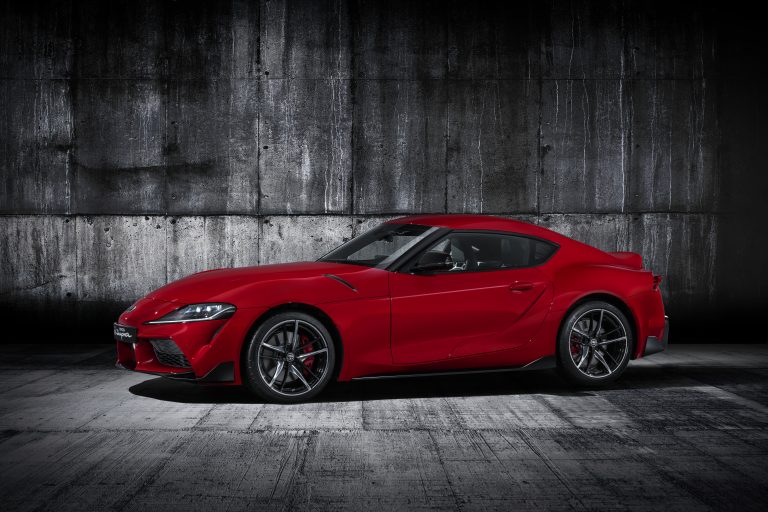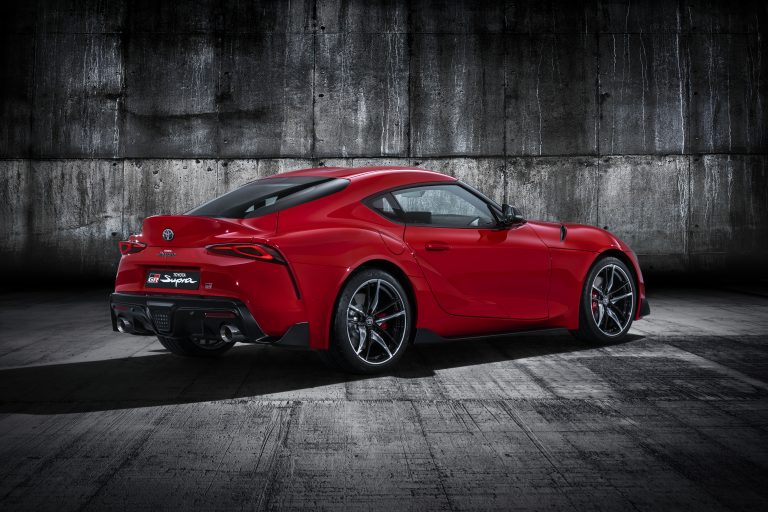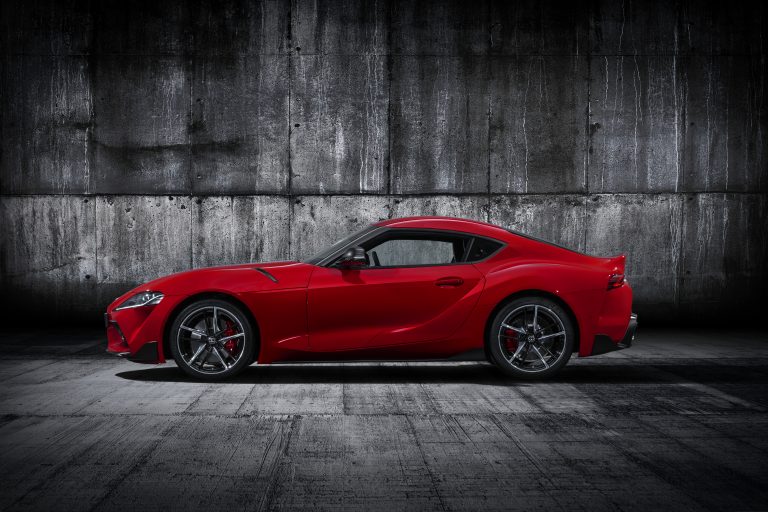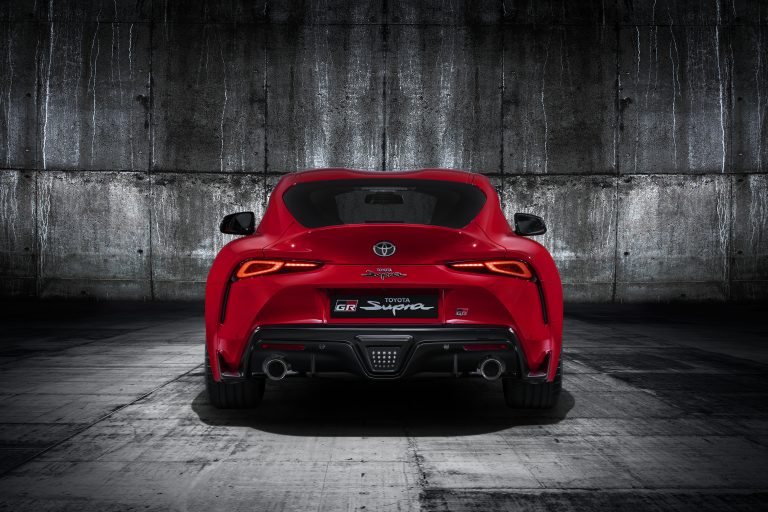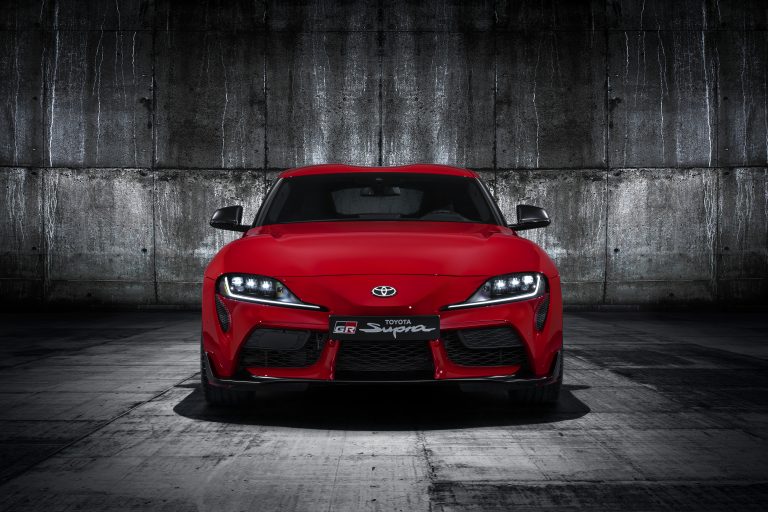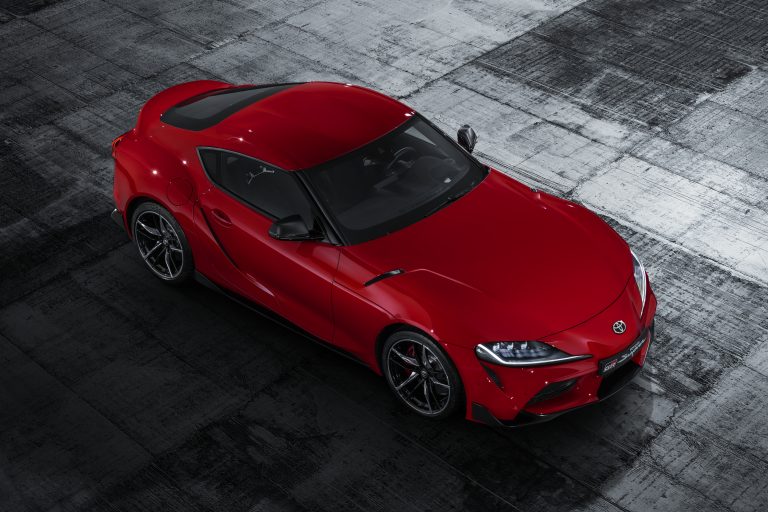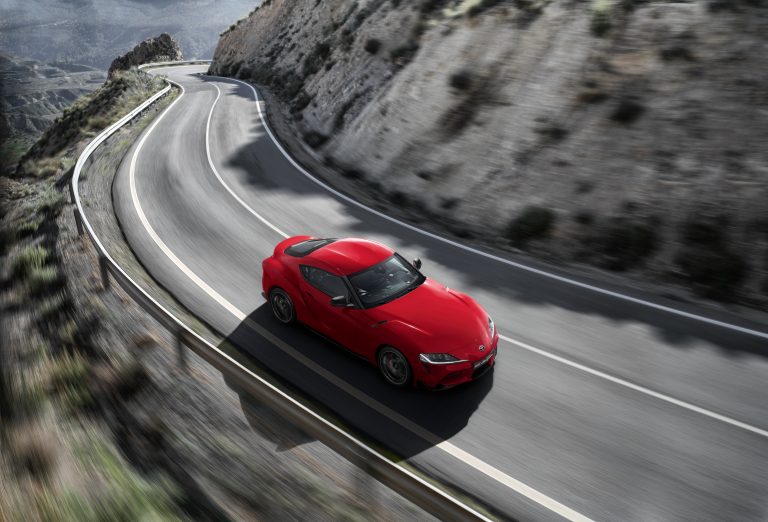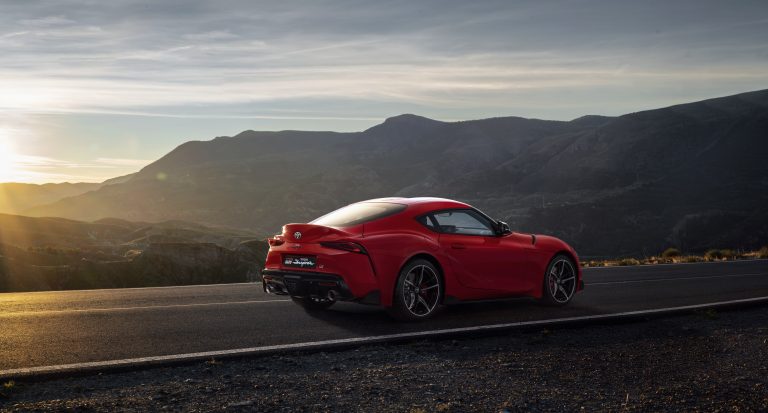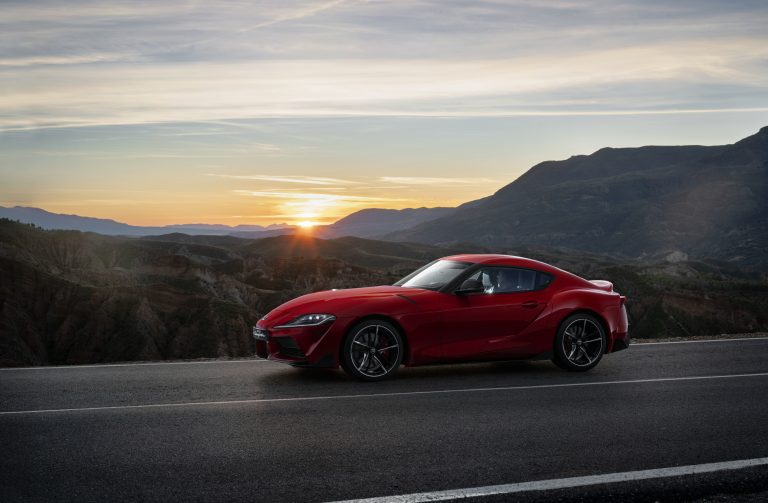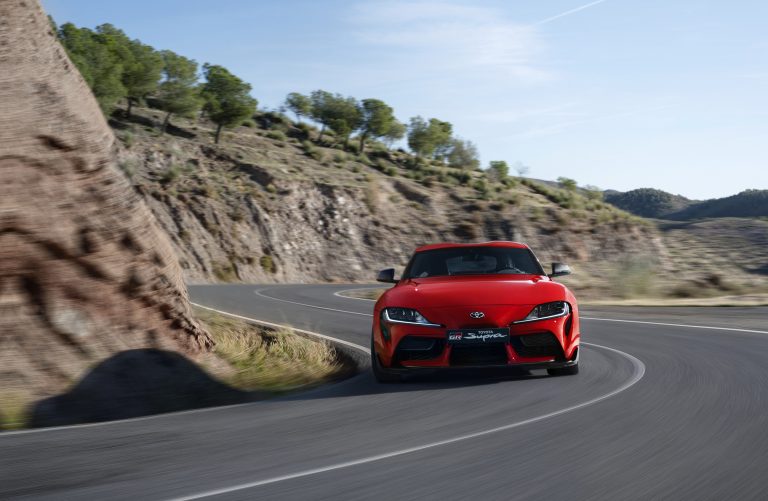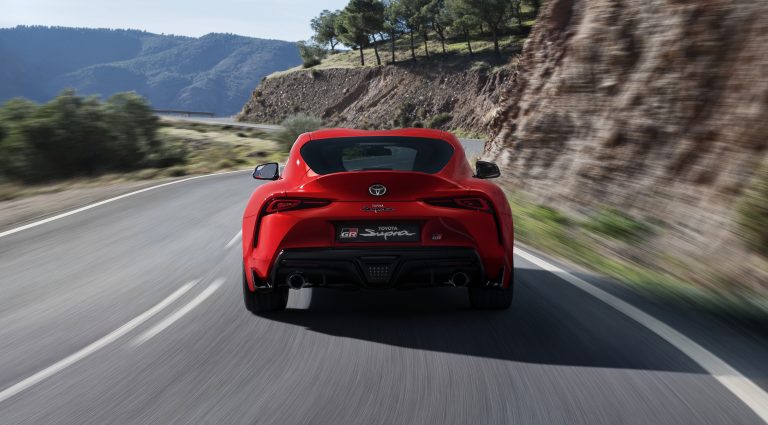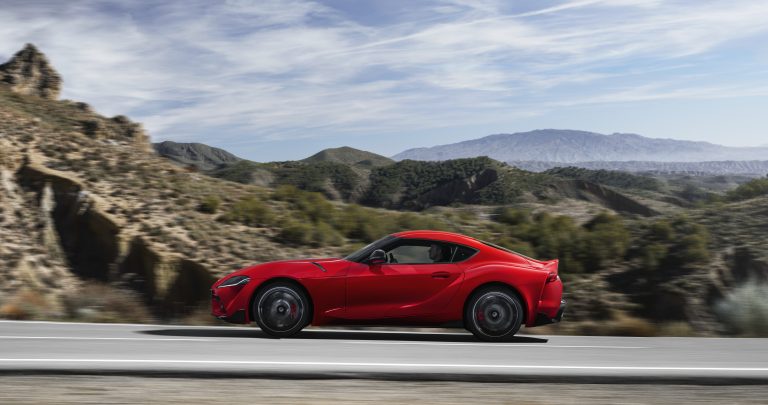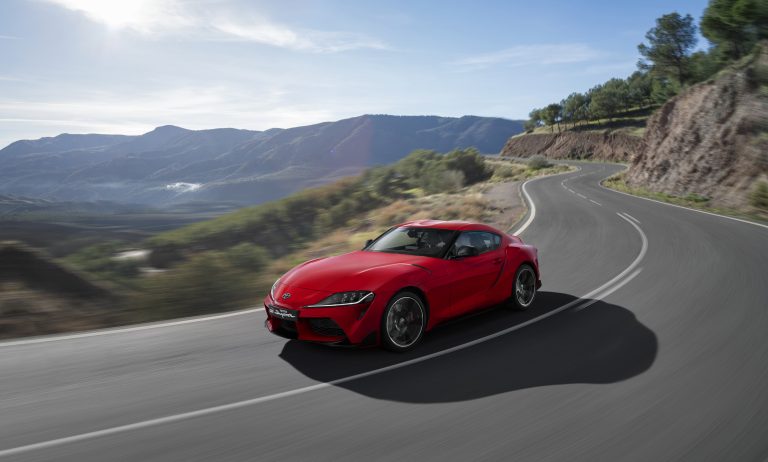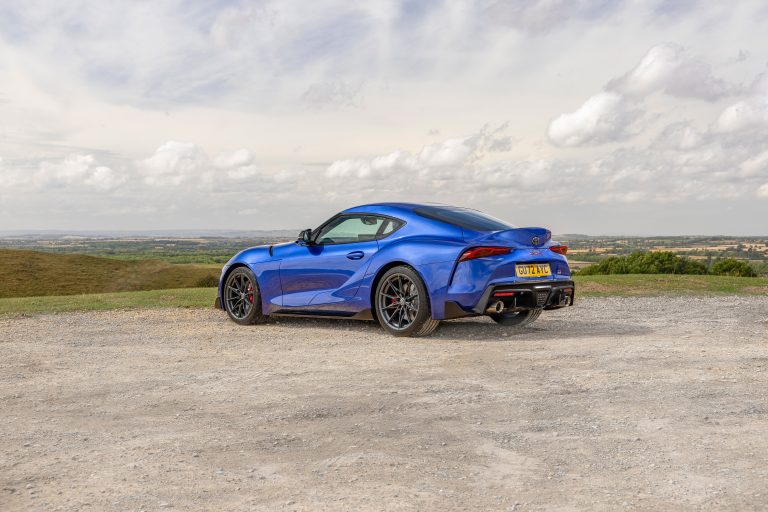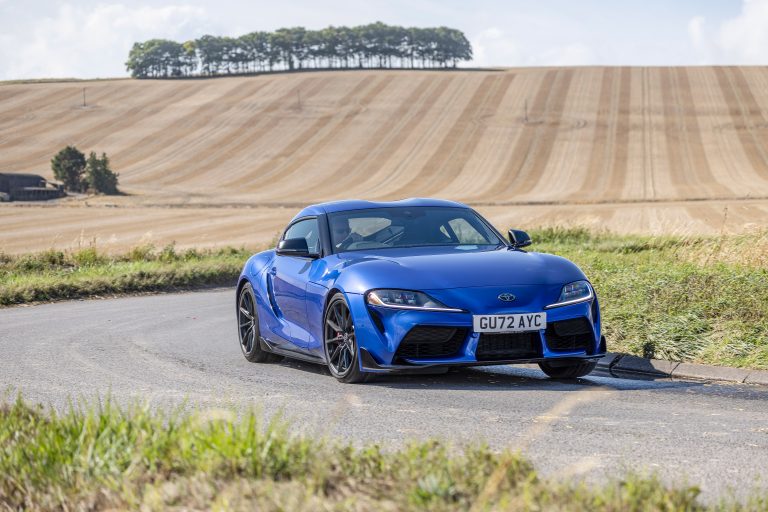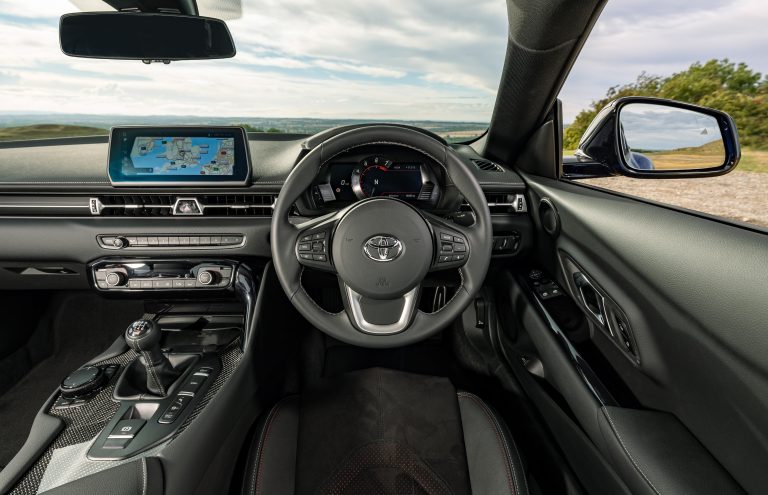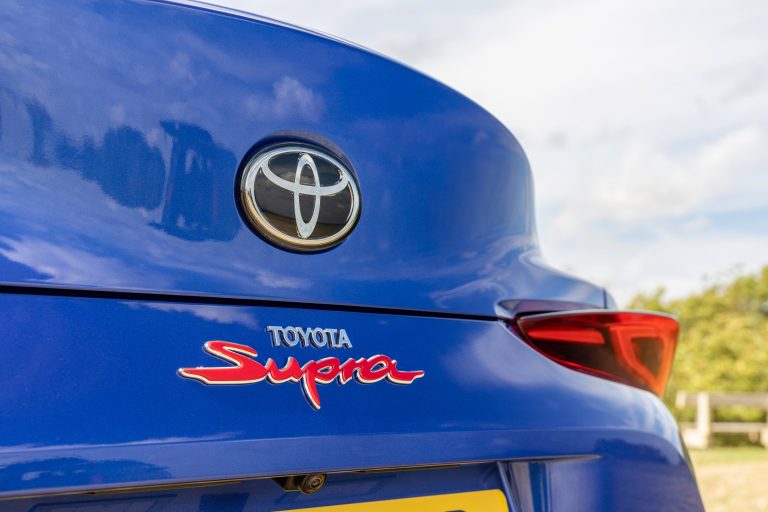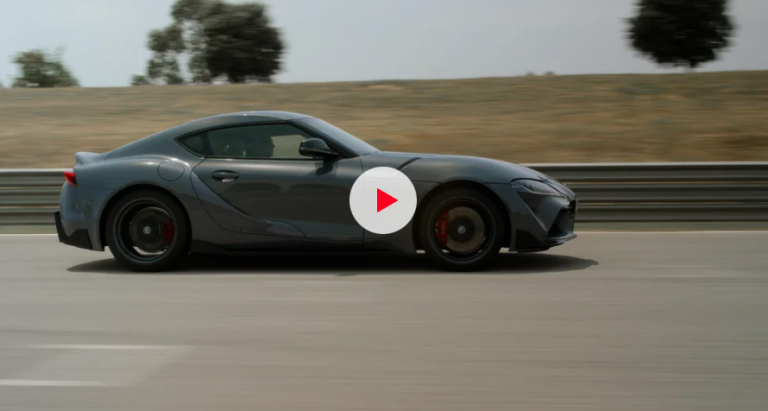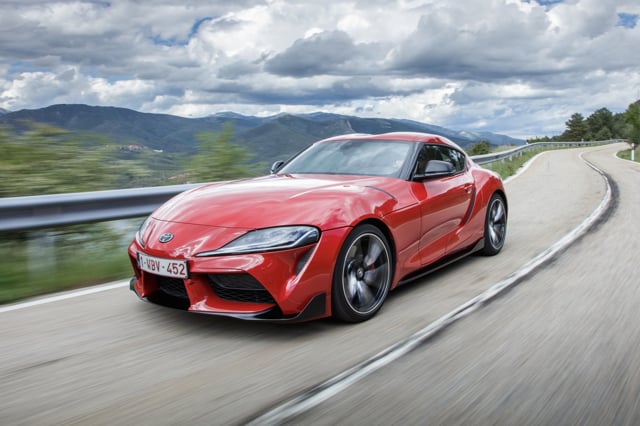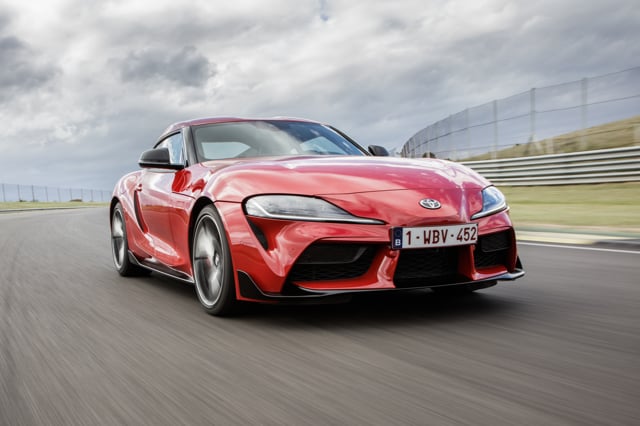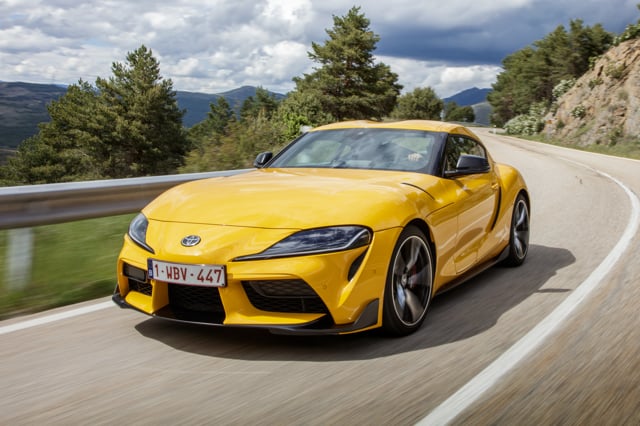The Legend Returns: World Premiere of the new Toyota GR Supra at the 2019 North American International Auto Show
- First appearance of the all-new Toyota GR Supra at NAIAS in Detroit
- ‘Condensed Extreme’ modern design that highlights power agility while also evoking the romance of classic styling from Toyota’s sports car heritage
- Two-seat cabin with perfectly driver-focused cockpit inspired by the feel and lay-out of single-seater race cars
- Classic sports car drivetrain featuring 335bhp turbocharged straight-six engine with 500Nm of torque and rear-wheel drive
- Short wheelbase and wide track achieve the 1.55 ‘golden ratio’ for exceptional handling agility
- First customer deliveries from late summer 2019
- First global GR model produced by Toyota Gazoo Racing
The all-new Toyota GR Supra, the fifth generation of Toyota’s legendary sports car and the first global GR model to be produced by Toyota Gazoo Racing, makes its world debut today, 14 January 2019, at the North American International Auto Show in Detroit.
The new Toyota GR Supra has been conceived as a sports car in its purest form, with no compromise that would diminish the pleasure of the driving experience. Chief Engineer Tetsuya Tada has adhered to the classic form of a front-mounted, straight-six engine driving the rear wheels, building on the heritage of Toyota’s past Supra generations and original 2000GT sports car. Driving enthusiasts can look forward to an exhilarating blend of power, agility and precision handling, achieved thanks to the car’s combination of a short wheelbase and wide track, light weight, low centre of gravity and highly rigid body.
The 3.0-litre engine benefits from a twin-scroll turbocharger and produces 335bhp/250kW and 500Nm of torque. Coupled to an eight-speed automatic transmission, it is characterised by smooth and powerful acceleration, with large amounts of torque available across the full spectrum of engine speeds.
Toyota Gazoo Racing was instrumental in honing the new sportscar’s performance, working extensively on the famous Nürburgring Nordschleife and surrounding roads in Germany in order to achieve the most agile, stable and rewarding handling. Further extensive testing took place on roads around the world.
To be certain that the car delivered on its promise, Toyota President Akio Toyoda put it to the test at the Nürburgring in his role as a Master Driver before giving it the final green light.
New Toyota GR Supra customer deliveries will start from late summer 2019. All vehicles will be manufactured in Graz, Austria.
Pure sports car design
Even at first glance, it’s clear to see how Toyota’s great sports car heritage is referenced in the design of the new Toyota GR Supra. The landmark 2000GT’s influence in particular is evident in the long bonnet, compact body and double-bubble roof, while the distinctive look of the fourth generation Supra is captured in both the front and rear styling, in particular in the muscular rear wings and the arc of the integrated spoiler. The resemblance is more than skin-deep, though, as the new Toyota GR Supra shares the same classic sports car format of a powerful front-mounted six-cylinder engine and rear-wheel drive as its celebrated predecessors.
The Toyota Supra’s design theme was first previewed by Toyota in the dramatic FT-1 concept car, styled by its CALTY studio in California and revealed at the 2014 North American International Auto Show in Detroit. Toyota Supra Chief Designer Nobuo Nakamura gave his team a simple brief around the concept of ‘Condensed Extreme,’ purposely avoiding any emotive words so that they were free to express their vision of a pure and individual sports car in a truly original design.
“With Chief Engineer Tada pursuing driving pleasure, I knew that my mission was to create a design that would be visually and physically exciting to sports car fans,” he said. “By using a straight-six front engine, rear-wheel drive layout – something rarely seen in today’s cars – I was able to reach something beyond Toyota’s boundaries.”
‘Condensed Extreme’ refers directly the vehicle’s packaging, comprising three principal elements: a short wheelbase, large wheels and wide stance; a taut, two-seat cabin; and a long bonnet with a compact body that reflects the drivetrain combination of in-line six engine and rear-wheel drive.
Nakamura envisioned a car that is indisputably modern in design, yet evokes the romance of classic sports car styling. The result approached the limits of what could be manufactured in higher volume, in particular the powerful curves of the rear wings.
In the finished design, the ‘Condensed’ theme is evident in the relationship between the Toyota GR Supra’s large-diameter tyres, short wheelbase and overall length. It’s notable that the wheelbase is in fact shorter than in the Toyota GT86 coupe, and the tyres are larger. ‘Extreme’ is interpreted in the car’s wide stance, with tight cabin proportions and a wide track, contributing to a high level of manoeuvrability and stability.
The design was precisely calculated to achieve both optimum drag and lift characteristics, and an ideal front/rear weight balance. For example, the double-bubble roof is not simply a heritage-inspired styling feature, it is effective in reducing drag by reducing the car’s frontal area, without sacrificing headroom in the cabin.
The frontal design was inspired by the fourth generation Supra but has an even more expressive look with a low stance emphasised by a prominent central grille flanked by large air intakes that are essential for engine cooling. The distinctive headlight units have a six-lens LED arrangement incorporating the turn indicators and daytime running lights. Positioning the lamp units closer in towards the nose adds further visual volume and power to the shell-like front wings.
In side view, the low bonnet generates a dynamic line that flows rearwards from the car’s low nose, while the back edge of the bonnet and the rear spoiler are set at almost the same height, linked by a low belt line. The underbody has a slight forward angle while the cabin has a strong rearward slant, with blacked-out front pillars and character lines on the side of the roof emphasising the taut, compact cabin. Sharp-looking, sturdy sills express the car’s high rigidity. In Europe, the Toyota GR Supra will be fitted as standard with lightweight but highly rigid 19-inch forged alloy wheels with alternating black and polished-finish slim spokes.
At the rear, the arching lip spoiler has been optimised to suppress lift, while a trapezoidal shape to the rear bumper generates a sense of movement down and out towards the tyres. The rear combination lights have a simple internal ring arrangement, while the distinctive rear fog lights and reversing lights are formed by dot-LEDs grouped in the centre of the lower bumper.
The Toyota Supra’s evocative styling will be shown to its best effect by a range of eight different colour choices for the paintwork, including strong red, yellow and blue shades. A new Matt Storm Grey finish with a matt finish and a hint of blue will be available for a special edition model, adding extra visual drama and a metal-like texture to the car’s curved surfaces.
Cockpit concept: putting the driver at the centre of the action
The driver’s cockpit in the new Toyota GR Supra neatly combines traditional GT elements with ultra-modern functionality. Designed to help the driver focus entirely on the business of driving, it is directly influenced by the lay-out found in single-seater race cars. The low, slim horizontal dashboard maximises the forward view through the windscreen, helping the driver place the car with precision in high-speed driving, while the principal controls are tightly grouped for quick and easy operation. The instrument panel, centre console and door trim combine in a seamless design that gives the cockpit a strong, unified feel.
The shape of the cockpit flows down into soft, supportive knee pads in the door trim and on the side of the centre console, their shape calculated with the benefit of Toyota Gazoo Racing’s circuit racing experience.
The head-up display, meters and paddle shifts all sit directly in front of the driver, with additional switches located on the three-spoke steering wheel. The wheel itself is contoured for excellent grip and is wrapped in leather. The 8.8-inch high-definition driver’s instrument display is clearly visible through the steering wheel, with the 3D-effect tachometer and shift indicator positioned in the centre; a digital speed read-out is to the left and infotainment and navigation information is to the right.
An asymmetric centre console marks a clear division between the enveloping driver’s cockpit and the more open passenger side of the Toyota GR Supra’s cabin. Knee pads are provided here, too. The air conditioning control panel sits proud of the console, with memory-touch switches for easy operation, and an 8.8-inch central multimedia display is mounted above the console. This display can be operated as a touch screen, or by using a rotary controller.
The boot space is large enough for two people’s luggage for a weekend away and can be extended with a removable panel at the back of the cabin, creating enough space for a golf bag or all the personal kit needed for a track day.
Racing-inspired seats
The new Toyota GR Supra’s seats have a racing-influenced design that ensures comfort at all times and excellent support, in particular if the car is being used on-track. Body-holding side bolsters are featured on the cushion and the high back, and there is an integrated head restraint. The upholstery options include leather and a combination of leather bolsters with a perforated Alcantara covering for the seat back and cushion that provides a degree of air ventilation and additional body holding performance.
Engine performance
The performance heart of the new Toyota GR Supra is its 3.0-litre in-line six-cylinder engine, producing up to 335bhp/250kW and 500Nm of torque. It is fitted with a twin-scroll turbocharger, high-precision direct fuel injection and continuously variable valve control that secure segment-leading torque performance from very low revs. The unit is powerful, well-balanced, smooth and light revving, with an exhilarating acceleration feel.
It is matched to an eight-speed automatic transmission that provides lightning-fast up and downshifts, with short ratios selected for the lower gears; the driver can take control of gear changes using paddle shifts on the steering wheel, and can select Normal or Sport driving modes to suit their preference and the conditions. A Launch Control function enables powerful acceleration from standstill with maximum traction, helping the car move from rest to 62mph in just 4.3 seconds. Engine sound and response, shift pattern, damping, steering and active differential performance are adjusted when the driver selects Sport mode. The Vehicle Stability Control has a special ‘track’ setting that can be selected, reducing the level of system intervention so the driver has greater control of the vehicle’s dynamic performance.
Active differential
All versions of the Toyota GR Supra sold in the UK and Europe will be fitted with an active differential that operates both when accelerating and decelerating and can seamlessly adjust from zero to full, 100 per cent lock, with instant response. A dedicated ECU monitors a wide range of inputs, including steering wheel, throttle and brake pedal operation, engine speed and yaw rate, for appropriate triggering of the actuator.
It delivers huge benefits in stability and efficiency when the tyres are reaching their performance limit. The effect is felt in all phases of cornering, with increased stability during the braking and cornering phases and then maximum grip as the driver accelerates out of the bend.
Chassis designed for optimum balance
A car’s exterior dimensions are the first task to consider when starting with a clean sheet of paper. Where the Toyota GR Supra is concerned, these were defined in order to prioritise the car’s agility and handling. The key calculation is the ratio between the wheelbase length and the track width. The best balance of great agility and superior stability is achieved with a ratio of between 1.5 and 1.6; achieving the 1.55 ‘golden ratio’ was thus the starting point for the Toyota GR Supra development team and the key building block on which everything else has been optimised.
Intensive handling development programme
High targets were set for the handling performance and these were achieved in a development programme led by Toyota Gazoo Racing that included extensive testing on a wide variety of challenging roads worldwide. The on-road testing also included sessions on race tracks, including the Nürburgring Nordschleife. High structural rigidity (greater even than the Lexus LFA supercar), a centre of gravity lower than the GT86 coupe and ideal 50:50 front/rear weight distribution were fundamental to achieving the dynamic goals, but required bold engineering decisions. For example, the desired weight balance was gained by moving the engine as far as possible rearwards, which introduced new production challenges.
The high body rigidity allowed for more precise and detailed refinements to the suspension geometry and tuning of the shock absorbers. The new suspension design comprises double-joint spring MacPherson struts at the front and a five-link system at the rear. The front suspension subframe and control arm mounting points have been made extremely rigid to yield precise cornering characteristics, while the use of aluminium for the control arms and swivel bearings reduces the car’s unsprung weight, giving superior agility and efficiency. The new Toyota GR Supra also features high-performance wheel hubs with an increased camber and optimised kinematics. The electric power steering is sports-tuned and can be adjusted in Comfort and Sport steering modes.
The rear suspension benefits from a similarly lightweight design for the rigid subframe and the bracing that connects it to the body, helping ensure extremely precise wheel control. The 19-inch forged alloy wheels are fitted with high grip Michelin Pilot Super Sport tyres. These are slightly wider at the rear than the front. The suitably powerful brakes are fitted with four-pot Brembo callipers.
The first GR model to be produced by Toyota Gazoo Racing for the global market.
Toyota Gazoo Racing is the umbrella organisation for Toyota’s global motorsports programme and in the past year has won both the Le Mans 24 Hours in the FIA World Endurance Championship and Manufacturers’ Championship in the FIA World Rally Championship. Its work is based on three pillars: developing people through participation in motorsport; creating fans through the excitement of motorsport; and applying the knowledge gained from motorsport to make ever-better cars for the road that are fun-to-drive.
This ethos was fully embraced by Kiichiro Toyoda, the founder of Toyota’s car-making business, and is shared today by Akio Toyoda, Toyota Motor Corporation President, to support the company’s commitment to building ever-better cars.
Starting with the Toyota GR Supra, Toyota Gazoo Racing will transfer the technical learnings it gains from the racetrack or rally stage to the development of not just new generations of Toyota’s sports-focused GR models, but also to its wider range of vehicles, driven by tens of millions of people around the world.
Supra ownership rewards
Toyota GR Supra owners in the UK will enjoy a number of special benefits through a dedicated rewards programme. In recognition of their enthusiasm for the return of the Supra name, they will be given access to special Supra-themed activities, events and branded items.
UK launch model range with Supra 3.0L and Supra 3.0L Pro grades
The Toyota GR Supra 2019 line-up will be introduced with two high-performance grades: Supra 3.0L and Supra 3.0L Pro.
At the entry point to the new model range, the Toyota GR Supra 3.0L will benefit from an all-inclusive specification that extends to high-performance features and systems to help the driver enjoy the car’s full dynamic potential. These include an active differential, Adaptive Variable Suspension, and 19-inch forged alloy wheels with a high-performance brake package.
Other Supra 3.0L grade features include dual-zone automatic air conditioning, Adaptive Cruise Control with stop and go, smart entry and push-button start, steering wheel with leather trim and auxiliary switches and a digital combimeter in the driver’s instrument display. LED technology is used for the adaptive headlights, rear lights and daytime running lights, and the mirrors (door mirrors and rear-view mirror) are all auto-dimming. Further convenience is provided by rain-sensing wipers and a rear-view camera.
The sports seats are upholstered in black Alcantara and are power-adjustable (including lumbar support), with integrated heating and memory functions. The infotainment specifications feature a 10-speaker audio system with 8.8-inch display, navigation system with Supra Connect (in applicable markets), Bluetooth and USB port.
Safety features include Supra Safety+ package, which comprises Blind Spot Monitor, Lane Change Departure Alert, Rear-Cross Traffic Alert, Rear-end Collision Alert, and intelligent parking sensors with automatic braking. In addition, there is an eCall function that will send an automatic location alert to the emergency services in the event of a serious collision, and a Tyre Pressure Monitoring System. All Toyota GR Supra models are fitted with an alarm.
The Supra 3.0L Pro grade, expected to account for most of the model sales in the UK, builds the specification with black leather upholstery, 12-speaker JBL premium sound system, head-up display, wireless mobile phone charger and storage and lighting packs.
Detailed specifications and prices will be announced on the dedicated Toyota GR Supra websites across Europe from today (14 January 2019).
Toyota GR Supra 3.0L A90 Edition
The Toyota Supra prototype made an impressive international debut when it appeared in front of the crowds of the Goodwood Festival of Speed in the summer of 2018.
Clothed in a head-turning black, red and white camouflage inspired by the Toyota Gazoo Racing colours, its cameo appearance echoed the heritage of the Supra’s famous ‘A’ chassis code with a new ‘A90 reference.
To celebrate the Supra heritage and the introduction of the fifth generation code number, an exclusive Toyota GR Supra 3.0L A90 Edition model will be built at launch, with production strictly limited to just 24 examples for UK customers. The A90 Edition will be finished in a dramatic new Storm Grey matt paint finish, equipped with matt black alloy wheels and a driver’s cockpit upholstered in red leather. In other aspects, its equipment specification will match the Supra 3.0L Pro model.
The Toyota GR Supra 3.0L A90 Edition will be offered to all UK customers who have placed a pre-sales reservation. The first to convert their reservation into a vehicle order will have the option to specify a Supra A90 Edition as their model choice.
UK Supra pricing and ordering process
Order books open tomorrow (15 January) for the new Toyota GR Supra in the UK. Those customers who have already secured reservations will be able to progress with an order for their preferred model grade and colour. Toyota retailers each have a dedicated Supra champion who will offer customers a personalised service, discussing their individual preferences and options to secure the car that is right for them.
The on-the-road prices are: –
Toyota GR Supra 3.0L £52,695
Toyota GR Supra 3.0L Pro £54,000
Toyota GR Supra 3.0L A90 Edition £56,945
Toyota President Akio Toyoda welcomes the new Toyota GR Supra
Toyota President Akio Toyoda, who is also a Master Driver, said: “Back in the day, I spent countless hours driving an old Supra at the Nürburgring to become a Master Driver. Supra is like an old friend that holds a special place in my heart. While other manufacturers were putting their beautiful new prototypes which they were going to introduce through their paces, I was driving an old Supra, just like a lot of other die-hard Supra fans around the world. I secretly wanted to make it happen. The new GR Supra was born through testing at the Nürburgring, and I can honestly say that it is a car that is fun to drive and better than ever.”
Toyota GR Supra technical specifications
| ENGINE | ||
| Type | 6 cylinders, in-line | |
| Valve mechanism | 24-valve DOHC with variable valve control and variable camshaft timing | |
| Fuel system | Direct injection | |
| Supercharging | Single twin-scroll turbo | |
| Displacement (cc) | 2,998 | |
| Bore x stroke (mm) | 82.0 x 94.6 | |
| Compression ratio | 11.0:1 | |
| Max. power (bhp/kW @ rpm) | 335/250 @ 5.000 – 6.500 | |
| Max. torque (Nm @ rpm) | 500 @ 1,600 – 4,500 | |
| Emissions level | Euro 6d | |
| TRANSMISSION | ||
| Type | 8-speed automatic | |
| Gear ratios (:1) | 1st | 5.250 |
| 2nd | 3.360 | |
| 3rd | 2.172 | |
| 4th | 1.720 | |
| 5th | 1.316 | |
| 6th | 1.000 | |
| 7th | 0.822 | |
| 8th | 0.640 | |
| Reverse | 3.712 | |
| Final drive | 3.150 | |
| PERFORMANCE | ||
| Power to weight ratio (kg per kW) | 6 | |
| Max. speed (mph) | 155 (electronically limited) | |
| 0-62mph acceleration (sec) | 4.3 | |
| FUEL CONSUMPTION & EMISSIONS | ||
| All fuel consumption figures TBC | TBC | |
| Fuel tank capacity (l) | 52 | |
| CO2 emissions – NEDC correlated (g/km) | 170 | |
| SUSPENSION | ||
| Front suspension | Double joint sprung strut axle in aluminium-steel construction with hydraulically damped torque strut bearings | |
| Rear suspension | 5-link axle in lightweight aluminium-steel construction | |
| STEERING | ||
| Type | Rack and pinion, electric power steering | |
| Overall ratio | 15.1:1 | |
| Min. turning circle (m) | 11 | |
| BRAKES | ||
| Front (diameter x thickness, mm) | Ventilated discs, 348 x 36, with 4-pot fixed callipers | |
| Rear (diameter x thickness, mm) | Ventilated discs, 345 x 24, with single-pot floating callipers | |
| TYRES | ||
| Type | Michelin Pilot Super Sport | |
| Front | 255/35 ZR 19 96Y | |
| Rear | 275/35 ZR 19 100Y | |
| DIMENSIONS | ||
| Overall length (mm) | 4,379 | |
| Overall width (mm) | 1,854 | |
| Overall height (mm) | 1,292 | |
| Wheelbase (mm) | 2,470 | |
| Front track (mm) | 1,594 | |
| Rear track (mm) | 1,589 | |
| Load space – VDA (l) | 290 | |
| WEIGHTS | ||
| Kerb weight – minus driver (kg) | 1,495 | |
| Kerb weight – ECE (kg) | 1,570 | |
| Gross vehicle weight (kg) | 1,815 | |
ENDS

